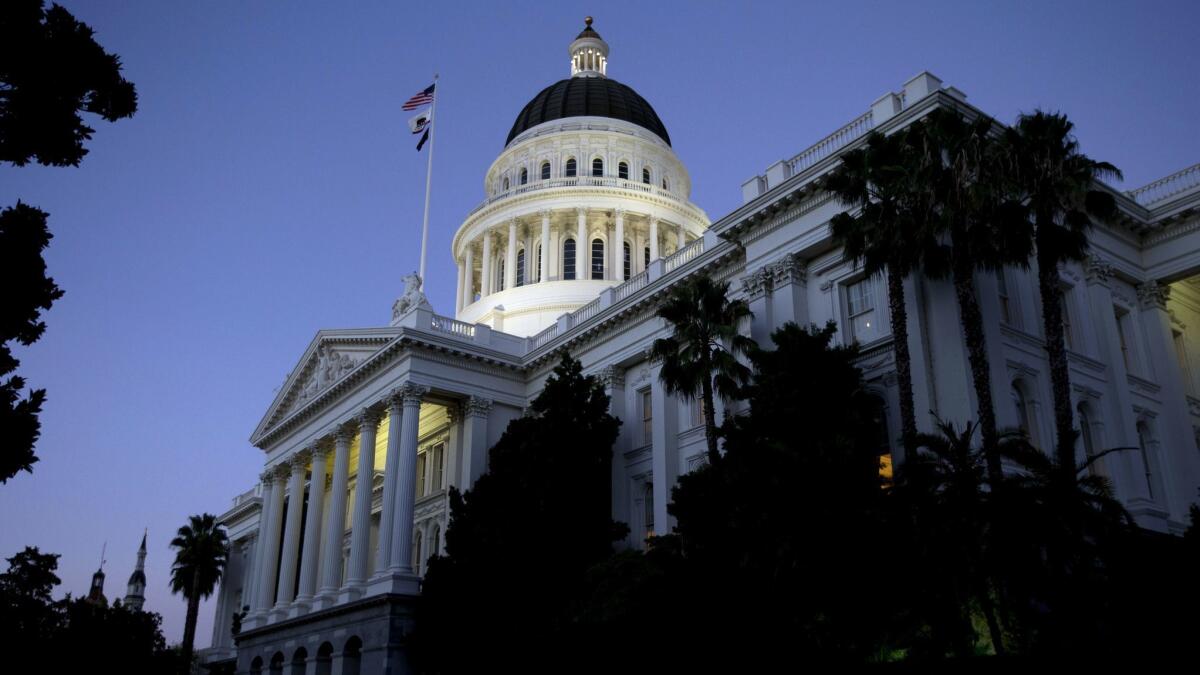Editorial: California is as blue as it’s ever been. Hopefully Democrats prove themselves worthy

- Share via
State Sen. Andy Vidak (R-Hanford) lost more than his seat in the Legislature when he conceded the race to his Democratic challenger, Melissa Hurtado, on Monday. His defeat gives Democrats back the veto-proof supermajority in the state Senate they lost in June after a Republican-backed recall of state Sen. Josh Newman (D-Fullerton). It also strips Vidak’s party of the last little bit of power it retained in the Legislature: the ability to stymie Democrats on major issues.
Most legislation can be passed by a simple majority vote, which Democrats have long been able to muster on their own. But it takes a two-thirds majority to raise taxes, pass urgency measures, revise the state Constitution or place a constitutional amendment on the statewide ballot. That’s why getting big things accomplished usually requires securing votes from members of both parties. Considering how the state Republican party has savagely punished members of its diminishing ranks who dared to side with Democrats — such as on last year’s important cap and trade legislation and the long-overdue increase in the gas tax — that kind of bipartisanship is extraordinarily unlikely.
Vidak shouldn’t take his loss too hard. Dozens of Republicans saw their campaigns swamped by the blue wave that swept across the nation; in California, it hit like a liberal tsunami. The seat held by Vidak’s termed-out GOP Senate colleague, Anthony Cannella, turned blue on Tuesday. And in California’s congressional races, the Republican Party did even worse. Although ballots are still being counted, at least four of the 14 Republican-held congressional seats in California have flipped, including the one held by Rep. Dana Rohrabacher (R-Huntington Beach), practically an institution in Orange County.
The Democratic lock on power means there’s the potential for excess, particularly with the restraining hand of Gov. Jerry Brown soon to be lifted.
Once the vote count is finalized in coming weeks, the numbers could be even worse for Republicans. As it is now, Democrats stand to control more combined state and congressional seats than at any time in history. That includes every statewide constitutional office from governor to the nonpartisan superintendent of public instruction, along with both U.S. Senate seats. The surge helped Assembly Democrats pad their supermajority to hedge against any unforeseen departures in the months ahead. (It happens; think of the two Assemblymen who quit within the last year after they were accused of sexual misconduct.)
Vidak and his colleagues have no one but themselves to blame for their political marginalization. California’s leftward tilt has been evident for decades in the changes in party registration numbers. But instead of adopting a more moderate form of conservatism that might appeal to the growing Latino and Asian residents of the state, they doubled down on an anti-immigrant and anti-tax path that led them to the brink of extinction as officeholders in the Golden State.
Enter the Fray: First takes on the news of the minute from L.A. Times Opinion »
Supermajorities come and go, at least they have in recent years, and Democrats should make haste to address issues that are difficult to tackle otherwise, such as tax reform and police accountability. California’s heavy reliance on income and sales taxes to fund the government makes the state budget vulnerable to sharp peaks and valleys. Lawmakers ought to fix this before the next economic downturn. One thing they may need to take on immediately is whether Pacific Gas & Electric and Southern California Edison, the state’s two largest power providers, can survive financially if their power lines are held liable for the Camp and Woolsey fires.
The Democratic lock on power means there’s also the potential for excess, particularly with the restraining hand of Gov. Jerry Brown soon to be lifted. Gov.-elect Gavin Newsom may profess to have more fiscal restraint than he gets credit for, but there’s no reason to believe he will be as frugal as Brown, whose penny-pinching ways have been a healthy check to spendthrift legislators. In fact, Newsom has already committed to investing in early childhood education, a costly if worthy endeavor. That’s not necessarily a bad thing. With state revenues so flush — on Wednesday the state’s legislative analyst projected a $14.8 billion budget surplus in the coming year — California ought to be investing in sensible projects and programs that pay real dividends in the long run, particularly those that benefit Californians most in need, such as poor children.
The voters have put a lot of trust in Democrats to lead the state in a wholly different direction from the one being taken by the nation’s leaders. We hope they prove worthy of it.
Follow the Opinion section on Twitter @latimesopinion and Facebook
More to Read
A cure for the common opinion
Get thought-provoking perspectives with our weekly newsletter.
You may occasionally receive promotional content from the Los Angeles Times.









